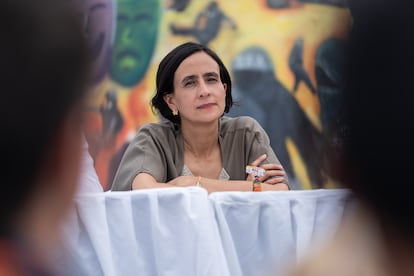Colombia launches the world’s first biodiversity bonds at COP16
The initiative seeks to involve the private sector in efforts to preserve biological diversity


Colombia has used the occasion of COP16 being held in Cali to launch bonds with an exclusive focus on biodiversity projects for the first time in Latin America. The announcements, made on Monday in the South American country’s third-largest city, are part of an effort to create the innovative financial instruments required to scale up private sector investment for this purpose, with the aim of achieving the goals proposed by the Conference of the Parties to the Convention on Biological Diversity, the formal name of the summit.
Colombia’s Environment Minister Susana Muhamad, who is also chairing COP16, celebrated the announcement as “a funding milestone” for the recovery of nature. “We hope that it translates into joint public-private work models that take us forward to a transformation process at the pace that this emergency is placing upon us, but with the conviction that with this, it will begin to make sense that Colombia is one of the most biodiverse countries in the world for the welfare of our own population,” she said Monday, the day of the summit dedicated to the theme of finance and sustainability.
The minister was referring to a bond issued by Banco Davivienda in which the International Finance Corporation (IFC), an arm of the World Bank, will invest up to $50 million. The Colombian entity, in turn, will channel this money into loans for projects with positive impacts on biodiversity. In parallel, BBVA Colombia has launched another bond with the same focus, divided into two tranches: one of up to $35 million subscribed by IDB Invest, the investment arm of the Inter-American Development Bank, and another of up to $35 million subscribed by the IFC.
This unusual convergence between multilaterals seeks to mobilize resources not only for projects with positive impacts on nature, such as the well-known green bonds, but also for those that specifically protect, conserve, and restore biodiversity. This is in line with the action plan that Colombia announced at the start of the United Nations World Summit, which brings together more than 20,000 people in Cali over the course of two weeks.
The accelerated loss of biodiversity represents a global challenge, especially in Latin America and the Caribbean, a region that is home to six of the most biodiverse countries in the world, in addition to the Amazon, the so-called lungs of the world which holds the planet’s largest freshwater reserves. Among them Colombia stands out, the venue of COP16, half of whose territory is covered by forests and tropical jungles, bordered by two oceans and crossed by three mountain ranges. It is a favorable situation for the region. In addition to the Cali summit, Luiz Inácio Lula da Silva’s Brazil is leading this year’s G20 later this month, where climate and nature issues have been underscored; the president of the IDB, Ilan Goldfajn, heads the group of multilateral banks; and COP30 on climate change will be held in 2025 in Belem do Pará.
“What we need to do is align Latin America’s comparative advantages with the interest and appetite of these investors,” notes Gabriel Azevedo, general manager of Strategy at IDB Invest. Governments and multilaterals must develop a broad menu of financial instruments that serve different types of investors, he explains, including the thematic bonds that have gained traction in the last five years in the region. By way of example, IDB Invest has already participated in the issuance of 46 thematic bonds in 13 countries, 12 of them in Colombia. “This opens the way; it serves as a gateway for other banks to seek to do the same,” Azevedo says of the first biodiversity bond.
The issue of financing is one of the most sensitive, both in biodiversity and climate change negotiations. Without the private sector, the world will not be able to achieve the targets agreed in the Kunming-Montreal Global Biodiversity Framework, say several observers. “Private capital is critical. Governments have quite limited fiscal space today, most countries in the region maintain their fiscal responsibility, so expecting most of the investments to come from governments is unlikely. The demands are huge,” adds Azevedo.
Tu suscripción se está usando en otro dispositivo
¿Quieres añadir otro usuario a tu suscripción?
Si continúas leyendo en este dispositivo, no se podrá leer en el otro.
FlechaTu suscripción se está usando en otro dispositivo y solo puedes acceder a EL PAÍS desde un dispositivo a la vez.
Si quieres compartir tu cuenta, cambia tu suscripción a la modalidad Premium, así podrás añadir otro usuario. Cada uno accederá con su propia cuenta de email, lo que os permitirá personalizar vuestra experiencia en EL PAÍS.
En el caso de no saber quién está usando tu cuenta, te recomendamos cambiar tu contraseña aquí.
Si decides continuar compartiendo tu cuenta, este mensaje se mostrará en tu dispositivo y en el de la otra persona que está usando tu cuenta de forma indefinida, afectando a tu experiencia de lectura. Puedes consultar aquí los términos y condiciones de la suscripción digital.
Sobre la firma










































